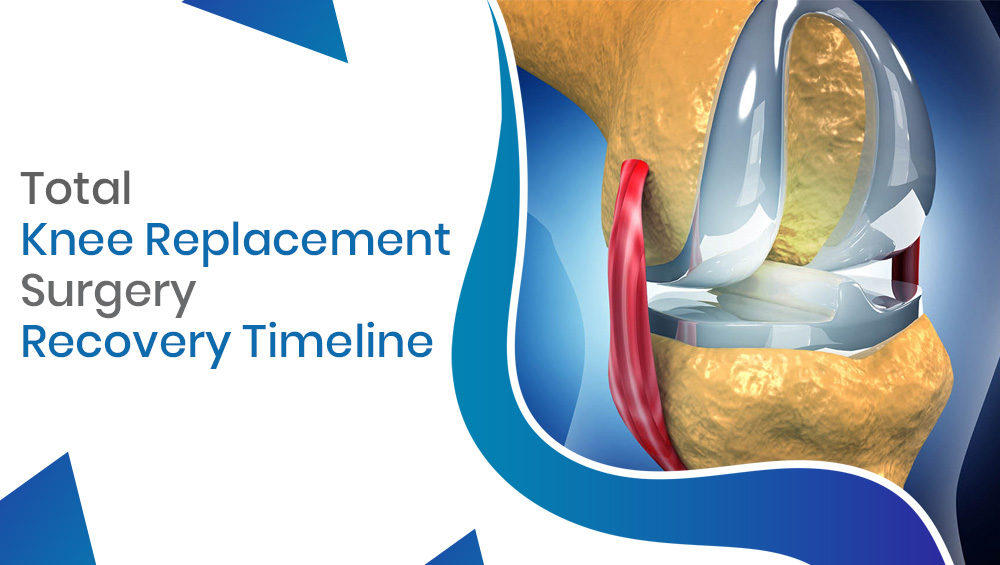Total Knee Replacement (TKR) recovery is a gradual, step-by-step journey toward pain-free mobility. While the surgery replaces the damaged joint, true healing happens during rehabilitation — when muscles regain strength, tissues settle, and confidence in walking returns.
Each patient heals differently. Some begin walking within days, while others take weeks to regain stability. Understanding the total knee replacement recovery timeline helps set realistic expectations and improves long-term outcomes.
What is Total Knee Replacement?
Total Knee Replacement is a surgical procedure in which the damaged knee joint surfaces are removed and replaced with artificial implants (prosthesis).
It is commonly recommended for:
-
Severe osteoarthritis
-
Rheumatoid arthritis
-
Post-traumatic arthritis
-
Advanced cartilage damage
-
Chronic knee pain not responding to medicines or physiotherapy
Successful recovery depends on surgical precision, implant alignment, and structured rehabilitation.
Factors That Affect Knee Replacement Recovery Time
Recovery speed varies from patient to patient and depends on:
-
Age and overall health
-
Weight and lifestyle habits
-
Pre-surgery activity level
-
Muscle strength before surgery
-
Commitment to physiotherapy
-
Presence of diabetes or other illnesses
Following rehabilitation protocols strictly helps restore mobility faster and reduces complications.
Week-by-Week Total Knee Replacement Recovery Timeline
First Few Days After Surgery
-
Standing and walking begin with assistance
-
Walker or crutches are used
-
Pain and swelling are managed with medications and ice
-
Early movement prevents stiffness and blood clots
1–2 Weeks
-
Physiotherapy starts immediately
-
Focus on wound healing and gentle motion
-
Basic bending and straightening exercises begin
-
Assisted walking continues
3–6 Weeks
-
Muscle strength improves
-
Knee flexibility increases
-
Walking becomes easier
-
Some patients transition from walker to cane
7–12 Weeks
-
Balance and joint control improve
-
Daily activities become comfortable
-
Most patients walk without support
-
Driving and desk work may resume (as advised)
6–12 Months
-
Full healing and implant settling occur
-
Knee feels stable and natural
-
Maximum strength and endurance return
Best Exercises for Knee Replacement Recovery
Regular physiotherapy is essential for restoring knee function.
Supported Walking
Builds confidence and improves joint loading safely.
Straight Leg Raises
Strengthens thigh muscles supporting the knee.
Heel Slides
Improves knee bending and flexibility.
Ankle Pumps
Boosts circulation and prevents blood clots.
Consistent exercise ensures faster and safer recovery.
Tips for Smooth Knee Replacement Recovery
-
Avoid high-impact activities early
-
Remove home obstacles to prevent falls
-
Follow medication schedules strictly
-
Attend all physiotherapy sessions
-
Maintain protein-rich diet for healing
-
Keep surgical wound clean and dry
Lifestyle discipline plays a major role in long-term implant success.
Warning Signs: When to Call Your Doctor
Mild pain and swelling are normal, but seek medical care if you notice:
-
Fever or chills
-
Excessive swelling
-
Persistent severe pain
-
Redness or wound discharge
-
Sudden loss of knee movement
-
Calf pain or breathing difficulty
Early intervention prevents complications like infection or clots.
Long-Term Recovery Outlook
By 3 months:
-
Most patients resume routine activities
-
Walking becomes comfortable
-
Pain reduces significantly
By 1 year:
-
Implant fully integrates
-
Strength and endurance peak
-
Patients return to active lifestyles
Low-impact activities like cycling, swimming, and walking are encouraged, while running and jumping should be limited.
Conclusion
Recovery after Total Knee Replacement is progressive but highly rewarding. From assisted steps in the first week to independent mobility within months, each stage marks improvement.
With expert surgical care, structured physiotherapy, and patient commitment, long-term pain relief and restored mobility are achievable.
For patients considering knee replacement, personalized care and guided rehabilitation play a crucial role in achieving safe and successful outcomes.
FAQs
Q1. How long does it take to recover from total knee replacement?
Most patients recover basic mobility within 6–12 weeks, while full recovery may take up to 1 year.
Q2. When can I walk after knee replacement surgery?
Walking usually begins within 24–48 hours with support.
Q3. Is physiotherapy necessary after knee replacement?
Yes, physiotherapy is essential to restore strength, flexibility, and joint function.
Q4. When can I drive after knee replacement?
Driving is usually possible after 4–6 weeks, depending on recovery progress.
Q5. What activities should be avoided after knee replacement?
High-impact activities like running, jumping, and contact sports should be avoided.


